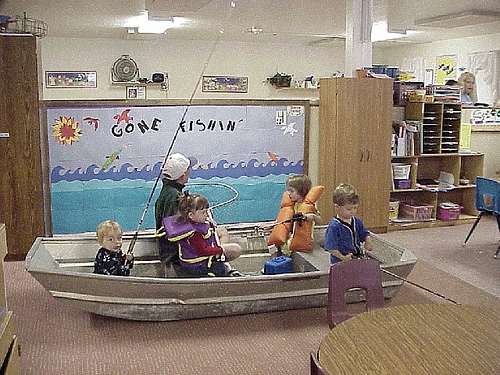Tom_#467404
TOM_#467404.DOC
Head Start CARES
TOM_#467404
OMB: 0970-0357
Tools of the Mind
(http://www.mscd.edu/extendedcampus/toolsofthemind/)
The Tools of the Mind (Tools) program is a research-based “scaffolded play and learning activities” program that can be embedded into existing Head Start programming to build strong foundations for school success in children by promoting their intentional and self-regulated learning.

Tools is an early childhood education curriculum based on the work of Vygotsky, who views learning as active play and as socially mediated by teachers and classmates. The curriculum seeks to develop cognitive skills such as self-regulation, deliberate memory, and focused attention while developing academic skills such as symbolic thought, literacy, and mathematical understanding. While child-centered, as the name suggest, Tools also emphasizes the teacher’s role in guiding and supporting children’s acquisition and development of various psychological “tools.”
The
central component of Tools
is
a daily 50-minute time block devoted to make-believe play, which is
organized and supported by teachers to enhance child planning
skills, social role understanding, deliberate memory and focused
attention, and social-emotional understanding. Teachers model
desired behaviors then gradually shift responsibility to children as
they develop autonomous learning strategies. During make-believe
play, children participate in three
types of interactions necessary for self-regulation development:
being regulated by others, regulating others, and self-regulation.
The Tools program systematically tries to help children plan their activities, retain these plans in memory, and enact them during the pretend play sequence block – all key aspects of children’s executive function. Moreover, the program is intended to overlay this approach over all the learning activities throughout the child’s preschool day.
The Tools program also restructures a number of other activities, reducing the need for behavioral management on the part of teachers during “whole-class” instruction. Thus, the program secondarily is likely to affect the structure of classroom routines and the quality of instruction. The skills that children learn through the Tools program should directly affect children’s social-emotional adjustment and behavioral approaches to learning, as well as emerging academic skills.
In a Tools classroom:
Children control their social, emotional, and cognitive behaviors by learning how to use various mental “tools”.
Teachers support children's moving along the continuum of self-regulation from being regulated by others to becoming "masters of their own behavior."
Frequency of lessons: Daily make-believe play block (50 minutes)
| File Type | application/msword |
| File Title | Tools of the Mind |
| Author | DANA.FONEY |
| Last Modified By | Ximena Acevedo |
| File Modified | 2008-10-02 |
| File Created | 2008-10-01 |
© 2026 OMB.report | Privacy Policy